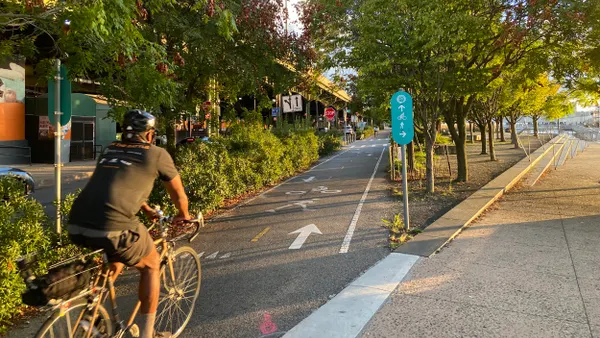Travelers between coastal cities could someday fly along the water aboard an all-electric conveyance that is part boat, part seaplane. It's called a seaglider, and Regent, the company sharing that vision, unveiled a quarter-scale prototype yesterday in Florida during the CoMotion Miami conference.
The company also announced yesterday that New Zealand-based Ocean Flyer had signed an agreement to purchase 25 seagliders in a deal valued at $427 million. The order consists of 15 vehicles with 12-passenger capacities and 10 that could carry up to 100 passengers each. Ocean Flyer is a new venture from the owner of New Zealand-based private jet and charter transportation company Air Napier.
The seaglider is the dream of a couple of Massachusetts Institute of Technology graduates who founded Regent Craft in 2020 with financing led by Thiel Capital and JAM Fund.
While the vehicle resembles an eVTOL aircraft, it takes off and lands only on water and does so with the aid of a hydrofoil. Essentially an underwater wing, a hydrofoil lifts the vessel out of the water at a certain speed.
Billy Thalheimer, co-founder and CEO of Regent, explained during a conference presentation that once airborne, the seaglider rises only a short distance above the surface of the water using a phenomenon known in aviation as the "ground effect": When a descending airplane is close to land or water, the air and pressure distortions between the wings and the surface create lift. It's why an airliner appears to float just before landing. "It's this cushion of air flying over the surface of the water," Thalheimer said.
Seagliders would depart from and move through harbors on the water, maneuvering around other craft like a boat. Once in open waters, they would lift off. Thalheimer said the 12-passenger seaglider could travel 180 miles at 180 mph. Future models could have up to a 500-mile range.
"We're focused on the maritime market, on coastal mobility," said Thalheimer. "And that's important [because] 40% of the world's population lives in coastal communities." He said Miami to Key West, Florida, would be a one-hour flight.
A full-scale prototype will be ready next year, and the company expects the first commercial product to be available in 2025, according to Thalheimer. "We're developing a fundamentally new mode of transportation," he said. "To change regional mobility, we need to go green, we need to go fast and we need to innovate."











